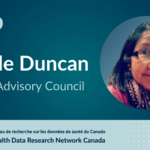Decolonizing health data: An interview with Lucille Duncan


Each year, September 30 marks National Day for Truth and Reconciliation, an acknowledgement of the devastating history and ongoing impacts of Canada’s residential school system. Ten years after the release of the Truth and Reconciliation Commission’s Calls to Action, Lucille Duncan has a simple question: “What is the health system doing to promote truth and reconciliation?”
As a member of the Binche Keyoh First Nation and a Dakelh Elder, Duncan has worked as an Aboriginal Support Worker in Northern British Columbia for nearly 20 years. “I was always interested in Indigenous health and how we can make things better for Indigenous people in the health system. I’ve always advocated for Indigenous people, for people living on the streets, and for people struggling with mental health and addiction.”
It’s about breaking the colonial way of doing things. It’s about making sure data is decolonized so that it creates safe spaces. Too often, people are categorized, put into boxes, and reduced to numbers. But we are more than numbers. We need to move away from that and do research in a good way. ~ Lucille Duncan
Today, part of Duncan’s work includes educating nurses, doctors and social workers on cultural safety and humility. “Education is a big part of reconciliation,” she affirmed. “We are in an era of truth and reconciliation. What that means to me is understanding the racism and discrimination Indigenous people face, especially people with substance use disorders who are stigmatized. It means knowing how government policies, residential schools and the Sixties Scoop still affect lives today through the justice and health systems.”
These historical injustices have led to skepticism and justified concern about how Indigenous health data are handled in a racist health system that has failed Indigenous people in BC. Duncan points to higher rates of rheumatoid arthritis, diabetes, heart disease and mental health issues among Indigenous communities. “All of this stems from the impacts of government policies. Do pharmaceutical companies use that data for experiments or clinical trials? Is the health system using it to actually help people?” For true reconciliation to occur, she continued, it is essential to address the broader historical context of Indigenous communities and their experiences with the health care system.
This is what underpins Duncan’s interest in health data, which began to develop through her work as an Elder for EQUIP Health Care, a research program based at the University of British Columbia that advances equity-oriented health care. “I started questioning how health data is used in research and the types of data itself: what kinds of data are being collected, where they are stored and how they are used,” she recalled.
Duncan continues to raise these and other questions about health data governance as a member of HDRN Canada’s Public Advisory Council, where she promotes meaningful discussions about Indigenous data sovereignty and reconciliation. HDRN Canada created the council to give the public a voice in conversations about health data governance. Duncan uses her voice on the PAC to advocate for Indigenous self-determination in health care, especially when it comes to the collection, storage and use of health data belonging to First Nations, Inuit and Métis Peoples. “It is helping the PAC understand proper terminology, acknowledge the land and territory we’re on, and include Indigenous perspectives and ways of being.”
Actions like these are critical, said Duncan: “It’s about breaking the colonial way of doing things. It’s about making sure data is decolonized so that it creates safe spaces. Too often, people are categorized, put into boxes, and reduced to numbers. But we are more than numbers. We need to move away from that and do research in a good way.”
